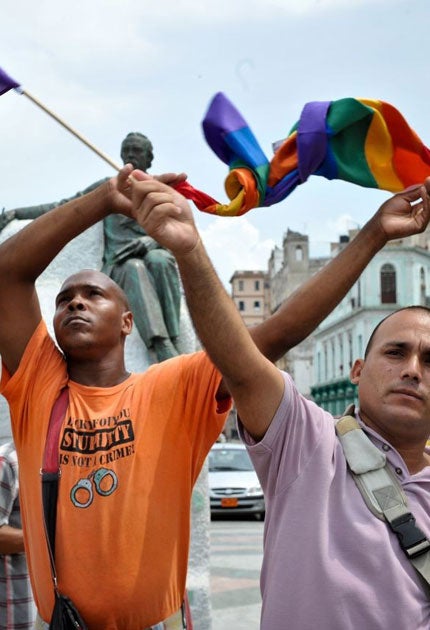Is this Cuba's Stonewall moment?
Last week the streets of Havana witnessed their first ever gay pride march. Gianluca Mezzofiore talks to those on the front line of the island's equality movement

Your support helps us to tell the story
From reproductive rights to climate change to Big Tech, The Independent is on the ground when the story is developing. Whether it's investigating the financials of Elon Musk's pro-Trump PAC or producing our latest documentary, 'The A Word', which shines a light on the American women fighting for reproductive rights, we know how important it is to parse out the facts from the messaging.
At such a critical moment in US history, we need reporters on the ground. Your donation allows us to keep sending journalists to speak to both sides of the story.
The Independent is trusted by Americans across the entire political spectrum. And unlike many other quality news outlets, we choose not to lock Americans out of our reporting and analysis with paywalls. We believe quality journalism should be available to everyone, paid for by those who can afford it.
Your support makes all the difference.The Stonewall riots of 28 June 1969 provide a key date for the advancement of gay civil rights.
On that occasion, a group of gay customers of the Stonewall Inn in legendary Greenwich Village took a stand against police harassment and raids and gave birth to a freedom movement that is still fighting battles now – as last week's legalisation of gay marriage in New York proved.
From this year, 28 June will also be remembered by Cuba's lesbian, gay, bisexual and transgender (LGBT) community for the first non-authorised march that took place in Havana, in the historic Paseo del Prado.
Instead of getting swamped by the bureaucratic maze of Cuban institutions and applying for a licence to march, the local Observatory for LGBT Rights opted for the easiest way: get together in the streets without authorisation. It's undoubtedly a challenge to the Castro regime, once known for its strictness regarding the right of freedom to assembly.
"Gay Pride is considered a capitalistic celebration and a provocation from the government," Ignacio Estrada, organiser of the march, says. "We extended the invitation to the Cuban authorities and they responded with silence."
According to local independent blogger Orlando Luis Pardo Lazo, police officers outnumbered the participants in the march, but despite being "very tense" they did not intervene.
Blogger Yoani Sanchez tweeted afterwards that the LGBT march had been "uneventful" and a "strong police operation had failed to intervene".
"Beside the importance for the LGBT community in Cuba, it is a civic victory," Lazo says. "The authorities need to learn that the streets do not 'belong only to the revolutionaries', as the official demagogy says."
However, Estrada notes a recent easing of tensions with the central government. "The march in Havana is something that is going to transcend history," he says. "The last few years have marked a resurgence for the promotion of our rights, thanks also to the work of Cenesex, the National Centre for Sex Education led by Mariela Castro Espin."
Mariela Castro – daughter of Cuban President Raul – has distinguished herself from her father for a restless campaign against the stigmatisation of gay people. Nevertheless, she has been criticised for her approach to LGBT issues.
"She occasionally dabbles in civil rights, but she's inconsistent," Cuban-American writer and journalist Achy Obejas says. "A lot of her work is, frankly, excellent, but it tends toward the medical."
On 17 June, Cuba backed the historic resolution for LGBT rights at the UN Human Rights Council. Later, Mariela Castro declared at the 20th World Congress for Sexual Health in Glasgow that Cuba's Communist Party might be ready to recognise LGBT rights, though her father advised her to "create the right conditions" first.
Times have changed since the anti-gay statements of Fidel Castro – for which he later apologised – as well as for formal anti-gay persecutions, purges, and labour camps in the 1960s created exclusively for LGBT people, according to Obejas. Criminal laws against homosexuality have been scrapped gradually since 1979.
However, there are still laws that are used against gay Cubans, including laws against flamboyance (sic), loitering, and – according to Obejas – "a kind of all-purpose law against 'potential dangerousness' that allows the government to detain people for what they might do".
Organisers of the historical march have promised to try again in 2012, this time with the government's blessing – or, at least, this is what they hope.
Join our commenting forum
Join thought-provoking conversations, follow other Independent readers and see their replies
0Comments